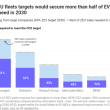Goldman Sachs has scrapped its internal diversity rule, which previously barred the bank from advising companies with all-male, all-white boards on stock market listings. The policy, introduced in 2020, required companies seeking Goldman’s assistance in going public to have at least two diverse board members, including one woman.
Richard Gnodde, Vice Chair of Goldman Sachs, told the BBC that the rule had achieved its purpose, driving behavioural change among businesses. “That policy was put in place to try and drive a behaviour change, and I think that’s happened,” he said.
Goldman Sachs initially implemented the rule with a requirement for one diverse board member before increasing the mandate to two. The decision to withdraw the policy follows recent legal developments regarding board diversity requirements. A spokesperson for the bank stated: “As a result of legal developments related to board diversity requirements, we ended our formal board diversity policy.” However, Goldman Sachs did not specify whether the move was linked to a U.S. federal appeals court ruling in December that blocked Nasdaq from enforcing diversity rules for listed companies.
According to the think tank The Conference Board, U.S. corporate boards are more diverse than ever, but progress has slowed. Between 2022 and 2024, racial diversity appointments declined, with non-white directors accounting for 26% of board seats among the 500 largest U.S. companies in 2024, while women held 34% of directorships.
The decision by Goldman Sachs comes amid a broader shift in corporate attitudes towards diversity policies. After his inauguration, U.S. President Donald Trump signed an executive order to eliminate government-funded diversity, equity, and inclusion (DEI) programmes. Several major corporations, including Google and Meta, have since scaled back their diversity hiring initiatives.
When asked whether Goldman’s decision was influenced by the Trump administration’s stance, Gnodde dismissed the suggestion, stating: “I can only speak for ourselves, and I don’t think that’s the case. Our ambitions are to continue to take things forward and, frankly, to go much further than we have been.”















